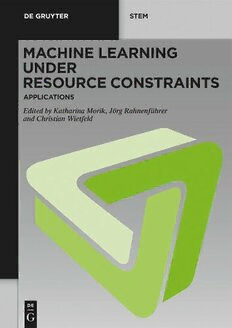
Machine Learning under Resource Constraints: Volume 3 Machine Learning under Resource Constraints - Applications PDF
02022·26.676 MB·English
Most books are stored in the elastic cloud where traffic is expensive. For this reason, we have a limit on daily download.
Preview Machine Learning under Resource Constraints: Volume 3 Machine Learning under Resource Constraints - Applications
Description:
Machine Learning under Resource Constraints addresses novel machine learning algorithms that are challenged by high-throughput data, by high dimensions, or by complex structures of the data in three volumes. Resource constraints are given by the relation between the demands for processing the data and the capacity of the computing machinery. The resources are runtime, memory, communication, and energy. Hence, modern computer architectures play a significant role. Novel machine learning algorithms are optimized with regard to minimal resource consumption. Moreover, learned predictions are executed on diverse architectures to save resources. It provides a comprehensive overview of the novel approaches to machine learning research that consider resource constraints, as well as the application of the described methods in various domains of science and engineering. Volume 3 describes how the resource-aware machine learning methods and techniques are used to successfully solve real-world problems. The book provides numerous specific application examples. In the areas of health and medicine, it is demonstrated how machine learning can improve risk modelling, diagnosis, and treatment selection for diseases. Machine learning supported quality control during the manufacturing process in a factory allows to reduce material and energy cost and save testing times is shown by the diverse real-time applications in electronics and steel production as well as milling. Additional application examples show, how machine-learning can make traffic, logistics and smart cities more effi cient and sustainable. Finally, mobile communications can benefi t substantially from machine learning, for example by uncovering hidden characteristics of the wireless channel. Ranges from embedded systems to large computing clusters. Provides application of the methods in various domains of science and engineering.
See more
The list of books you might like
Most books are stored in the elastic cloud where traffic is expensive. For this reason, we have a limit on daily download.
